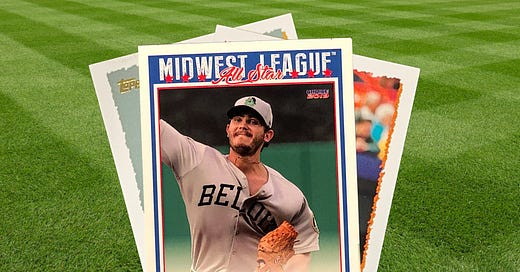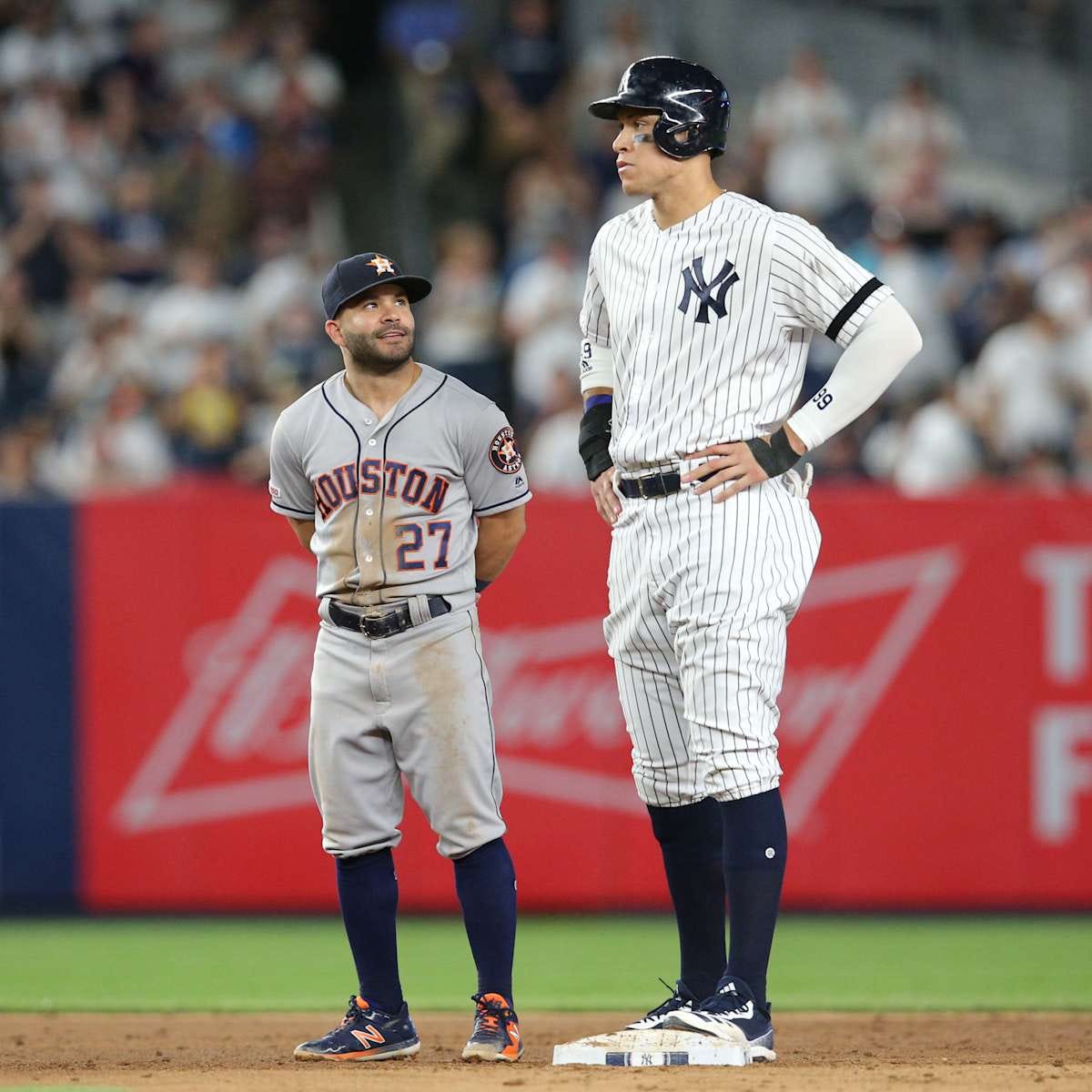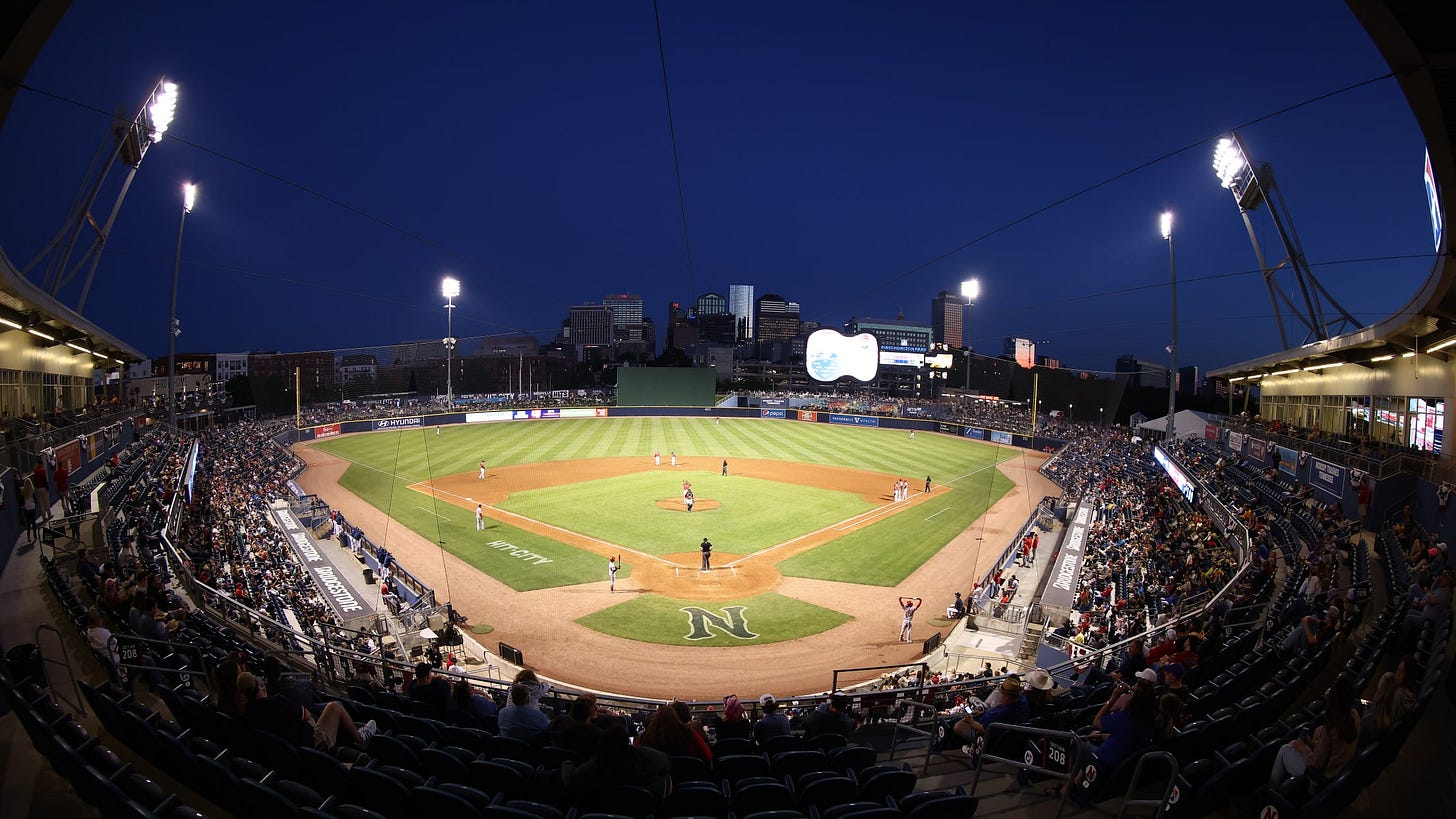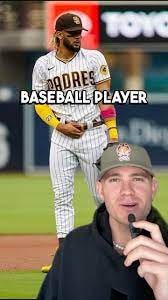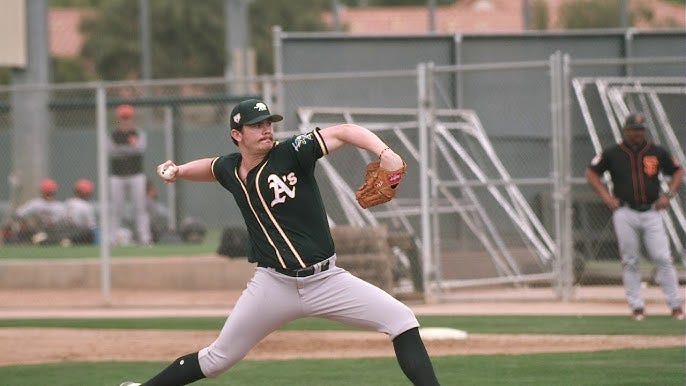Interview #50: Aiden McIntyre, former MiLB pitcher
A man drafted to a team that no longer exists, in a round that no longer exists, from a college that no longer exists
Intro
Aiden McIntyre is currently a baseball coach and content creator. Before that, he spent 5 seasons in professional baseball as a pitcher in the Athletics organization. And he was drafted to the team out of Holy Names University in 2018, a small college in Oakland that had never had a professional sports team draft one of their athletes until then. And before that, he was an undersized middle infielder in high school who got virtually no playing time in his junior and senior seasons.
He was born in 1995, which isn’t exactly ancient history, but the game has changed so much that his career is literally unrepeatable. He was selected in the 22nd round of the 2018 amateur draft as a college senior. As of 2021, the MLB draft is only 20 rounds. He was drafted after pitching two seasons for the Holy Names University Hawks. That university closed in spring 2023 after 154 years. He was selected by the Oakland A’s. They are now just the A’s, allegedly playing in Las Vegas someday soon.
But during his time as a pro baseball player, he also was in the middle of some seismic changes to minor league baseball. The 2020 pandemic wiped out the entire season for minor leaguers. A union was formed in 2022 to better living conditions and pay for the minors. At the same time, coming out of the pandemic, the size of the minors was reduced by 40 teams to 120 total, eliminating a lot of roster spots.
Now he does remote coaching and is a popular content creator. You can find him on his platforms here:
YouTube: @AidenMcIntyreBaseball
Instagram: @aidenmcintyre_
We talked about his drive to play professional baseball, transforming from a small infielder to a towering pitcher and his future in the sport.
Humble Beginnings
I don't know if you want to start anywhere specifically or we could just go straight into how you got into baseball to begin with…
I feel it would be hard to talk about my time in pro ball without my time before pro ball. It was something I fell in love with when I was 10 years old and started playing wiffle ball in the backyard with my brothers. When I look back on my baseball career, I always look at it as before high school and early high school, it was just a ton of fun and I was pretty good at it. And then my junior, senior year of high school was where I was just not very big.
I wasn't the most physical player. I started to struggle a little bit more there. I was a position player all the way through, and then my senior year I just didn't really play. I got benched my senior year and one of the coaches I had for a travel team pretty much told me, I think you should try pitching. So that was where that started. So high school season was over. Going into college it was, if you want to keep playing, that might be the might be the best route for you, which I'm grateful for now.
Who got you into baseball to start?
Baseball wasn't really in my family, but when we moved to Arizona, I was 10. My parents got me into a Little League that was right by our house, but a big portion of that was, my mom got a ton of the DVDs of baseball educational or history videos. So that was where I learned baseball; as a kid in Little League, my favorite players were all guys who had played in the 70s or the 80s. Hank Aaron was my favorite player as a kid. So that was where I feel my love for the game started was with the history side of it. Once I started playing, it was all I wanted to do.
So did you have to learn how to pitch? You're listed at 6’5”, 230 pounds, but you said you were small?
I was. My freshman year of high school, I was 5’2”. My sophomore year, I was 5’5”. So I was a middle infielder, perfect second baseman. That was my frame. And then my junior year was 5’8”, consistently kept growing. And then my senior year, that was where I hit 6’, 6’1”. But I mean, I kept growing all the way into college. It really wasn't until I was a sophomore in college that I hit 6’4”, 6’5” range. I think I grew about a foot from the start of high school to the end of high school.
So you started high school as Jose Altuve and you graduated as Aaron Judge.
Something like that. It was quite the transition. I think a lot of players, having now getting a chance with work with a lot of younger players, there's just so much about size and strength and physicality that you just don't really have much control over. I remember being able to go from middle infield to corner infield, went from being fast enough to really slow and then obviously having to learn a new position. There was a lot of adjustments and learning curves around that.
So you started pitching when you were about 6-foot. Did you have to keep changing your mechanics as you kept getting taller and heavier?
Yeah, it just naturally evolved. It wasn't till I really got stronger that I was then able to actually create more power. My freshman year, I was low-80s. And then again, similar thing with the height, just kept going up little by little. So yeah, I felt I was constantly adjusting. I feel like I also pitched with a lot of different, even in pro ball, pitched with a lot of different body types, which was interesting being a little bit lighter versus being heavier. My four years of college, there was a lot of adjustments made.
When you were in high school, were you thinking about pro ball at all or did that not happen till you started getting bigger?
Pro ball was always the dream. I think as a little kid it was a lot easier to feel like that dream was very reachable. That was always my goal, and I think it was probably my junior and senior high school where that started to get a lot more distant. It became, the way I describe it was I wanted to play as long as I could, and I wanted to feel I hit my ceiling. That was what I kept focused on because pro ball couldn't really be a thought at that point in high school when I wasn't really playing, I didn't have any college offers. So I think that my goal was mainly just to continue playing until I felt like I tapped my highest potential and hopefully that was at the big league level. But that was my goal in high school and then even in college, before I started to develop more into thinking that I had a shot to get drafted.
You’d think going from 5’2 to 6’5 in the span of 6 or so years is crazy, but just remember that I was 5’10 for a long time. Then a magically had a growth spurt to 6’0” when I was about 30 years old, or whenever dating apps became popular. ;)
Professional Baseball
You got selected in a round that doesn't exist anymore.
I did. Selected in a round that doesn't exist from a school that doesn't exist.
To a team that doesn't exist.
Yeah, that's true. I hadn’t thought about that yet.
You got drafted once?
I got drafted as a senior at Holy Names, which is no longer a school anymore. It was a Division-II school in Oakland. I spent my junior and senior year there and got drafted my senior year. My draft timeline really didn't start until very close to the end of my senior season. I don't think I had a single questionnaire until I had two more outings left in college. I had two more outings left and that was when I got my first questionnaire, and then within the time frame of the first one to the last outing I think I ended up filling out about 20 questionnaires. So it came all at once towards the very end of my senior year.
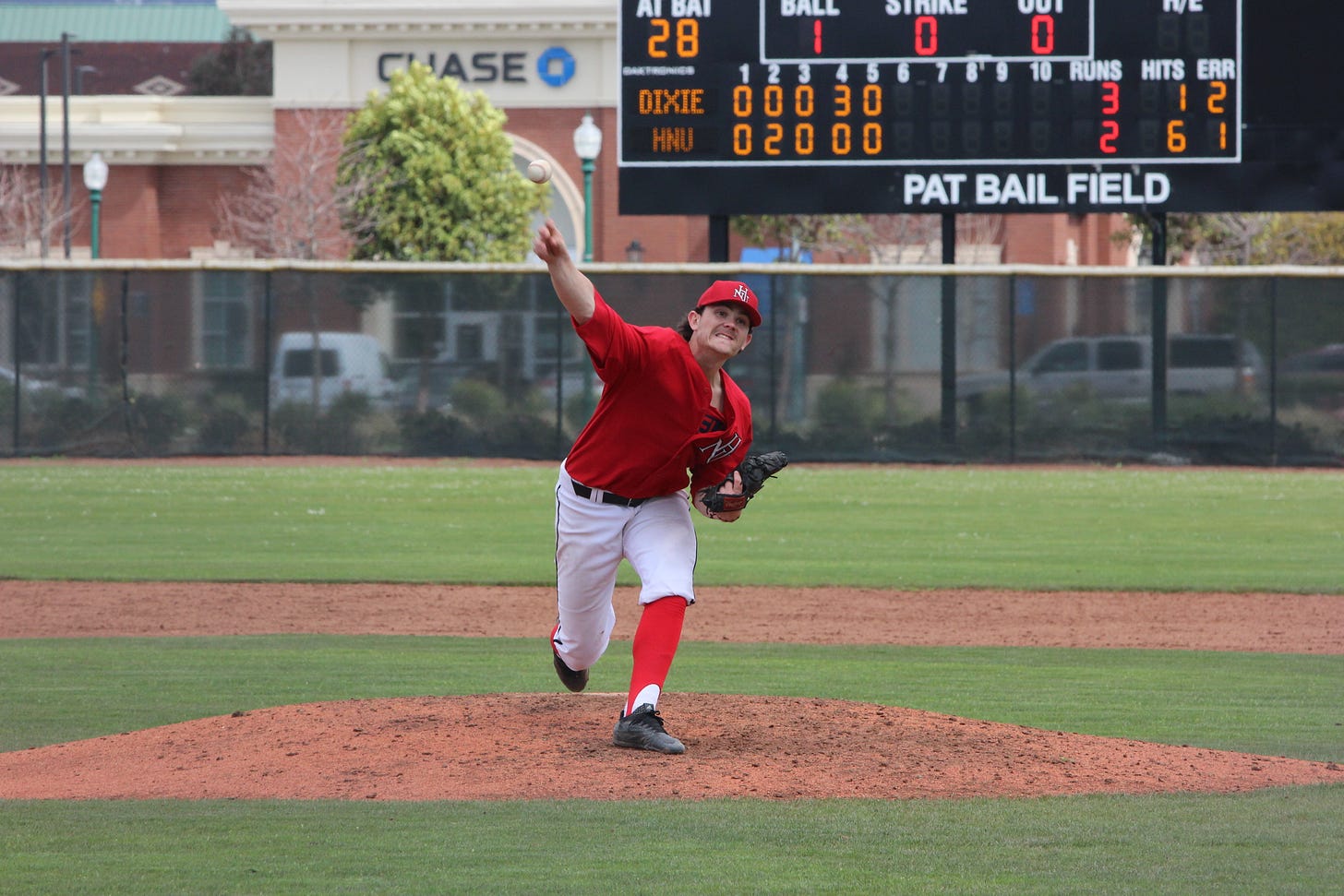
My junior year I was fine, I was mid-80s, I threw pretty well. I think I had better stats my junior year than senior year, but my senior year was really when, after my junior year I trained differently, again the whole push of wanting to feel I had done everything I could in my college career to give myself a chance. I will forever be grateful to the Oakland A's for drafting me. It was a rocky senior year, it was up and down, mostly down, from a statistical standpoint. But the velo increased. I had the frame for it, and I started throwing harder and striking people out, and that was pretty much what got me drafted.
Yeah, the strikeouts went way up. So did wild pitches. 18 in 13 games!
My first three years of college, I had very low walks, I had pretty much no command issues. And then my senior year I started throwing way harder. I went from being 85-86 to 92-94. And with the added velo there was just an added level of new command issues. Also when you throw harder, you create more swings and misses and so there was a lot more pitches to be thrown. There's a lot less baseballs being put in play. The strikeouts and the walks went hand in hand that senior year.
In 2019, you pitched in Beloit in the Midwest League. You had a lot of good stats there. Was the team feeling good about your progress?
2019 was a little bit of a mix. It was my first full season. I was working as a starter and the season was a tale of two seasons. First half was great and I led the league and pretty much everything, was an All-Star. Then second half of the season fatigue and everything set in a little bit. And from an age perspective, I was too old to be there for a full season. Overall, the year as a whole, there was definitely a lot of positive in it, but it was a learning experience for sure.
And then 2020 hits and you lost a year of development.
Not ideal for getting drafted at 22 to lose a year. But 2020 ended up being great for me, from a training perspective. Pretty much the only time you're ever going to get an entire year off to train. Made the most of it and came back in 2021 definitely better than I was in 2019.
So you don’t think missing a year of pro experience hurt you?
I don't think so. I think that I lost game experience, but I made sure to capitalize on having the opportunity to train for a year.
What was that year like? So they canceled the season and they never brought minor league baseball back. And for a while they were trying to not pay the minor leaguers. Obviously, a lot of other things were going on in the world, too, but for baseball players, especially ones without union representation, what was it like?
There was a lot of unknown is the best way I would describe it. For a while, they kept thinking the season was going to come back. So when we were sent home from spring training, it was just stay prepared. Until July, they were still hopeful bringing something back. But yeah, just a lot of uncertainty. And you were just on your own to figure out your training, and all of the gyms were closed. So there was a lot of throwing at parks. It was a really weird experience to be a part of, definitely. I mean it's the only time that I know of that the entire minor league season was just completely shelved.
Then when they came back, they shrunk the minor leagues. A lot of jobs disappeared.
Yeah, there were a lot of adjustments made after the 2020 season, from the drafting side to the roster side.
Did the minor leagues change much from when you started to when you retired?
Most of the positive changes came after I was released. In 2019, 2020, 2021, I was a pretty big advocate for minor league pay increase. Knowing what it was like then and getting that experience, I'm really grateful for what it is now. I'm grateful that the players who get to play now are able to be supported to do it, because we definitely weren't. I definitely think it's changed a lot for the better. I think the (amount of draft) rounds being a lot lower is hard. I know I wouldn't have gone drafted. But I do think that overall, the payment standpoint, the amenity standpoint and the value that teams are putting into their players now is significantly better than it was.
What was your favorite experience in the minors?
I think that one of my favorite experiences was when I got drafted, I was playing in the AZL, which is rookie ball in Arizona. At the end of that season, the A’s were making a playoff push, so there was a lot of movement at their triple-A level. So me and a few other guys went up for the last weekend of the triple-A season. So I went from pitching at D-II to pitching in a triple-A game all in the same season. Besides that, I have a lot of fond memories of my time in the minor leagues. Obviously the playing side of it, the teammate side of it, both of those have a lot of a lot of upside to it and I still have a ton of people who are really close friends from my time in the minor leagues. So I think that's probably the the best part of it as well.
Was there a town or a ballpark that was your favorite?
Pitching in Nashville, that was the triple-A stadium, in ‘19 was pretty great. Nashville Stadium was great. There's a handful of stadiums that were nice. Beloit, WI wasn't necessarily a destination spot. Neither is Midland, TX. I'd say my personal favorite that I played it for a little bit was the Lansing Lugnuts in Michigan. It was a good facility, great atmosphere.
So your final pro year was with the Chicago Dogs. I interviewed a guy who was a coach for the Milwaukee Milkmen and I didn't know that was a real team. You're 27 by then, what went into that year's decision to play independent ball?
In ‘22, I had surgery, came back, threw one inning, got released and it was towards the end of the season. So I wanted to give it one more shot, train the rest of the offseason, and ended up getting hurt right around spring training. Going out to Chicago I wanted to see how it felt playing again, wanted to give myself a little bit more time to see if it's still what I wanted to do. It was a good experience being there, but it was definitely an experience that showed me I was good. I felt I had tapped my playing potential and was in a spot where chasing baseball wasn't the most important thing to me anymore. I feel my time in Chicago was closure for my playing career, which I'm glad I got the opportunity to have.
So you don't feel you left anything out there then?
No, no, not at all.
What was it like adjusting from playing at Holy Names University and learning how to pitch there, and then you go in and you're playing in the minor leagues against some of the most elite players from around the world. What was it like facing that new skill level and trying to compete?
The skill level definitely goes up. It goes up each level in the minors, too. Obviously double-A is the biggest jump. But I mean, I was also developing. So from my senior year to 2022, I got significantly better. I figured out how to pitch a lot better. As the levels got better, I also got better. But the initial jump from college to pro ball was, yeah, I mean it was different. But I think that as the competition elevates, so does your performance.
So you never got intimidated.
Yeah. Even in college, being at a smaller school, having the confidence pitching against bigger schools, better schools, things like that, kind of the same thing in pro ball. Personally, for myself, on the mound, I was very competitive. That was my style of pitching. I was going to outcompete whoever I was facing, kind of like a chip on your shoulder. I knew what round I was drafted, I knew what position I was in, so I was never going to let myself feel like anyone was ever better than me.
So is that what you loved about playing the game was just the competition? How do you fuel that now? Seems like something that just doesn’t turn off and you're not even 30 yet.
I'm still very competitive, but I think now it's just outsourced into what I'm building or what I'm working on. And so it obviously translates a little bit differently. But I mean that was my favorite part about being a player, and especially about being a pitcher, too, is you get to compete. It was never me versus an entire lineup, it was me versus one guy. That was the approach I took. So I think outside of it now, whether I'm coaching or whether it's on the content creation side of things, I feel that same kind of competition just translates more directly into what I'm working on. It's not necessarily against somebody else now, it's just more what I can do.
So you were able to refocus those competitive juices.
Yeah, I feel I was able to figure out how to use that to my advantage going forward.
When you were smaller in high school and having to battle because you weren't who you were physically yet, do you think that’s where you developed that scrappiness trying to hang on the high school roster?
Yeah, I always felt like I had to work a little bit harder for the position I was in or the team I was on. I felt like I was always going to do a little bit more, work a little bit harder. I think the same thing applied to pro ball.
How were you able to get past any doubt, especially in high school when you didn’t even play one year, what kept you going?
I mean, honestly, I feel like it almost sounds cheesy, but I just loved baseball. I loved playing. So even when I wasn't playing, I think I just kind of had blinders up. I was just gonna keep going until I just didn't have any option to keep playing anymore. I don't know exactly what it was, but I saw myself as continuing to play even when I wasn't.
So you just refused to let baseball spit you out.
Yeah. I'm grateful to really not have any regrets about my time playing. I put the effort in. I was able to make the most of my opportunities. The hard thing with baseball is you'd always want more. It's the same thing with guys who play for 10 years and win a World Series, they still want more. So that never really changes. I think that line of knowing when it's your time, I really feel it's when it's not the most important thing to you anymore to continue playing.
But I think that there's a lot of players who have regrets about playing, and I feel fortunate to not really have those, but I was just gonna keep going until it was just so clearly not meant to be anymore. I feel I was able to get to that point. That same approach I had in high school, my goal was just pretty much play until I felt I had maxed out. I feel like I did that. Ideally everyone wants to max out as a 10-year big leaguer, but I think that being able to say that you got to that point where you feel you maxed out your potential no matter where it goes is the best way to be able to walk away as a player.
Very few people get to walk away from their baseball career feeling like they maxed out their potential. One of the things I’ve discovered doing all these interviews is that everyone reaches a point where baseball is too hard. Some of us hit that wall when the ball is still sitting on a tee. Some of us make it through 25 big league seasons before our bodies can’t handle the toughness of the game anymore. You can kind of tell what kind of personality someone has based on when and how they stopped playing baseball. Someone like Aiden, whose career baseball tried to halt his junior year of high school, stubbornly kept fighting and clawing until he got drafted and ultimately reached as high as triple-A. Those kinds of players, the ones like Craig Biggio or Dustin Pedroia who look like they’re squeezing every last drop of talent out of their body, are always the fan favorites for good reason. It takes of a lot of mental strength to keep grinding away in a sport and career where the Hall of Famers fail 70% of the time.
COACHING AND CONTENT CREATION
What did you do after your pitching career ended?
I had actually been coaching while I was in the minor leagues. I was a remote trainer cause financially I needed to support myself. Then also took a step back from baseball and went into some other work on more of the content coaching side as well.
That's where I found you is your reels keep popping up in my Instagram feed. What got you into building that brand and online presence?
I had always done content while I was playing, more so on the playing and training side of it. And then this year got into it from a product standpoint kind of by accident. It wasn't necessarily intentional, I just started making content around products and have been able to continue to grow that this year. I was also working as a YouTube coach and so gained a lot of insights and skill set in that area as well, which helped to support me to grow my own thing as well.
What goes into remote coaching? It's not one-on-one instruction or face to face. What's the challenge there as far as communicating it to people who are watching the video and trying to learn?
I think that there's a lot of players who don't necessarily have access to facilities or coaches in their area. So there's a lot that you can do from an online standpoint that definitely can be beneficial, especially for players who don't maybe have access to that. And then the content side of it kind of goes hand in hand.
It feels like baseball, to keep moving on, you've got to pour money into kids. Going to camps, travel teams and showcases and all this stuff that a lot of families may not be able to afford. So is there an audience for people who aren't able to afford those things?
My goal with my content, too, is to create accessibility for players, whether they are financially able to do all of that or not. So whether that's finding the best products that are affordable is always part of the content side of it. And then also trying to create content that can help. There is a lot of opportunity with showcases and things like that, but that's also not necessarily what you need to do to continue playing baseball, either. One of my goals is to make baseball accessible for anyone who wants to play it and not have the cost be something that can hold them back from continuing to play the game.
What steps do we need to take to make baseball accessible again?
One of the things that I'm going to continue to pursue is coming up with a lot of free resources that can be helpful to players. That's where a lot of the videos that I've made, the especially on the pitching training side of things, just giving as much information as you can to players so they can hopefully go be able to use that. I also think with the travel ball and all the different showcases, that's an area of baseball. But ideally having things like Little League, club ball that can be affordable, high school ball and allow players to continue playing. I think continuing to increase the accessibility of those levels, especially at younger levels, because I do think that once you get to older levels, college to pro ball, there is a lot of skill set that needs to be acquired and it goes beyond just free resources. But I think that at younger ages, there's a lot of value that can be given out that can hopefully support players.
Where do you see yourself in 5 years? Do you see yourself going into more in-person coaching?
Yeah, potentially. I see the mixture of content and then also training both being ways to be able to provide value. Then potentially if it can get bigger to the point of offering camps, offering clinics, whether that's working directly with the MLB or for other players. Being able to provide equipment, being able to provide training, I definitely want to, in five years, be a part of the game in a way that's helping to continue to grow it and helping to support players to continue playing as long as they can.
I love that Aiden is working to provide accessibility and affordability to young players. A sport that ultimately only requires a glove, bat, ball and big open space to play is increasingly more and more expensive to play. That not only includes rising equipment costs, but also joining club and travel teams, attending camps, clinics and showcases and little costs like batting cage time that add up. So to have someone advocating for those without the means for all that, like YouTube coaching videos anyone can stream, or his social media posts highlighting affordable gear, it’s great to see and hopefully it helps even just a tiny fraction of younger players keep their playing days going longer than their bank accounts might otherwise be able to handle.
LIFE AS A MINOR LEAGUER AND AN A’S FARMHAND
Your only experience was with the A’s organization. Was there anything you noticed in the lower levels that felt off compared to what other franchises provided for their players? You had the thing where they tried to not pay you during COVID. And then all the relocation and payroll cutting. Did any of that ineptitude from ownership filter through to the minors?
I think that as a minor leaguer you weren't necessarily as directly impacted by the stuff going on above. But I mean organizationally, it's not an organization that is highly regarded among players. Not even from a people standpoint, the trainers and a lot of those people were fantastic and there's a ton of really good people in the organization. But there was always definitely friction with I think ownership and just in the organization like you said. I mean they were the team who wasn't going to pay their players during COVID. There's a lot of things like that that were just out of touch and, I think that compared to other organizations, were more challenging as a player to go through.
Did some of that drive your desire to help improve things for all minor leaguers as far as quality of life?
I think that I was a pretty big advocate for it in 2020, 2021 with More Than Baseball (a group that advocated for unionization in the minor leagues). I just knew from a standpoint of wanting the best product for baseball, that this wasn't the way to do it. So by being able to provide, not an extremely high salary, but just a livable wage for players, how much positive impact that could have on the game as a whole, was something I was really passionate about. There was a lot of guys who I think could have been really good big league players who just weren't able to afford to play anymore as a minor leaguer because you didn't make any money.
Those wages were peanuts.
Yeah, in 2019, I made $8,000 and I paid for my housing, paid for meals. So I mean you weren't bringing anything in.
And then in the off season, not only do you have to train, but you've got to work.
I usually worked as a trainer and DoorDash driver. That's where there is separation between the guys who got paid a lot as a signing bonus, they didn't have to do that. So I think that now there's a little bit more chance for all players to be in a position where they can train the way that they need to train and be able to afford it, and hopefully not have to walk away from a potential career because they're not able to afford being a minor league player.
Hopefully these changes to minor league pay helps the game in the long run. Since professional baseball is now a 12-month a year job and players are expected to show up to camp in the spring ready to go, being able to focus on training and not dropping Burger King orders off at midnight to local frat houses, hopefully some of those longer shots, those undrafted free agents and late draft picks, get more time to polish their games and make an impact they otherwise wouldn’t have afforded to.
And again a huge thanks to Aiden for sharing his story, I thought it was one of the more interesting ones I’ve heard so far. It was really interesting to hear what life is like in the minors these days compared to previous generations, as well.

